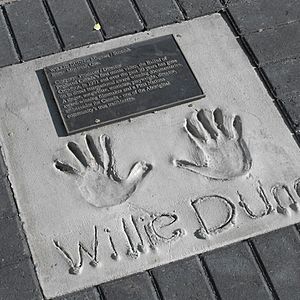Willie Dunn facts for kids
Quick facts for kids
Willie Dunn
|
|
|---|---|

Hand print, Aboriginal Walk of Honour, Edmonton AB
|
|
| Born |
William Lawrence Dunn
August 14, 1941 |
| Died | August 5, 2013 (aged 71) Ottawa, Ontario, Canada
|
| Occupation | Film director, producer, screenwriter, musician |
William Lawrence Dunn (born August 14, 1941 – died August 5, 2013) was a talented Canadian singer-songwriter, film director, and politician. He was born in Montreal, and his background was a mix of Mi'kmaq Indigenous heritage and Scottish/Irish roots. Willie Dunn often used his music and films to talk about important issues facing Indigenous people in Canada.
Music Career
Willie Dunn was a singer and played the acoustic guitar. He released several music albums during his career. Some of his albums include Willie Dunn (1971), The Pacific (1980), and Metallic (1999). His album Metallic featured songs from his earlier works.
One of Dunn's most famous songs was "I Pity the Country." This song spoke out against colonialism (when one country takes control of another) and unfair treatment of Indigenous people. Another well-known song was "Son of the Sun." The band Kashtin even covered this song on their album Innu. In 2004, Dunn released an album also called Son of the Sun, which had sixteen songs.
His songs "I Pity the Country," "Son of the Sun," and "Peruvian Dream" were later included in a special collection album. This collection, called Native North America, Vol. 1, came out in 2014. In 2021, another collection of his songs, Creation Never Sleeps, Creation Never Dies, was released.
Film Work
Willie Dunn also made films. He wrote a song called "The Ballad of Crowfoot" and then directed a short film with the same name in 1968. This film was made with the National Film Board of Canada (NFB). Both the song and the film talked about the unfair ways Indigenous Canadians were treated. They also showed how Indigenous people were taking control of their own future and becoming active in politics.
"The Ballad of Crowfoot" was very important. It was the first NFB film ever directed by an Indigenous filmmaker. The film won several awards, including a Gold Hugo for best short film in 1969. This award was given at the Chicago International Film Festival.
Dunn directed other films too, such as The Eagle Project, The Voice of the Land, and Self-Government. His music was also used in other films. For example, his music was in Incident at Restigouche, a film about a police event at the Listuguj Mi'kmaq First Nation in 1981. It was also used in Okanada, which was about a standoff between police and Indigenous protesters in Oka, Quebec in 1990.
"The Ballad of Crowfoot" is sometimes called the first known Canadian music video. In 2020, the Prism Prize created a special award in Willie Dunn's memory. The Prism Prize is an annual award in Canada for new and creative music videos. This new lifetime achievement award honors Willie Dunn's contributions to film and music.
Political Involvement
Willie Dunn was a long-time member of the New Democratic Party, a political party in Canada. He ran as a candidate for this party in the 1993 federal election. He ran in the area of Ottawa—Vanier. He received 3,155 votes in that election.
Beyond politics, Willie Dunn was also involved in cultural events. He took part in the Culturally Diverse First Peoples Arts Showcase tour in 1998. He was also featured in the Nations in a Circle spotlight in 2002. In 2005, he was honored and added to the Aboriginal Walk of Honour. Willie Dunn passed away in Ottawa on August 5, 2013, when he was 71 years old.
See also
 In Spanish: Willie Dunn para niños
In Spanish: Willie Dunn para niños
 | William M. Jackson |
 | Juan E. Gilbert |
 | Neil deGrasse Tyson |

